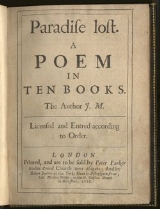
by the 17th-century English poet John Milton
. It was originally published in 1667 (though written nearly ten years earlier) in ten books, with a total of over ten thousand individual lines of verse
. A second edition followed in 1674, changed into twelve books (in the manner of the division of Virgil
's Aeneid
) with minor revisions throughout and a note on the versification; most of the poem was written while Milton was blind
, and was transcribed
for him.
The poem concerns the Christian
story of the Fall of Man: the temptation of Adam and Eve
by the fallen angel
Satan
and their expulsion from the Garden of Eden
.
Of Man's first disobedience, and the fruitOf that forbidden tree whose mortal tasteBrought death into the world, and all our woe,With loss of Eden, till one greater ManRestore us, and regain the blissful Seat.![]()
Sing Heav'nly Muse, that on the secret top Of Oreb, or of Sinai, didst inspire That Shepherd, who first taught the chosen Seed, In the Beginning how the Heav'ns and Earth Rose out of Chaos: Or if Sion Hill Delight thee more, and Siloa's Brook that flow'd Fast by the Oracle of God; I thence Invoke thy aid to my adventrous Song, That with no middle flight intends to soarAbove th' Aonian Mount, while it pursues Things unattempted yet in Prose or Rhime.![]()
What in me is darkIllumine, what is low raise and support;That to the height of this great argumentI may assert eternal Providence,And justify the ways of God to men.![]()
The infernal serpent; he it was, whose guile,Stirred up with envy and revenge, deceivedThe mother of mankind.![]()
Him the Almighty PowerHurled headlong flaming from th' ethereal skyWith hideous ruin and combustion downTo bottomless perdition, there to dwellIn adamantine chains and penal fire,Who durst defy th' Omnipotent to arms.![]()
As far as angels' ken.![]()
Yet from those flamesNo light, but rather darkness visible.![]()
Regions of sorrow, doleful shades, where peaceAnd rest can never dwell, hope never comesThat comes at all.![]()
What though the field be lost?All is not lost; th’ unconquerable will, And study of revenge, immortal hate, And courage never to submit or yield.![]()
To be weak is miserable,Doing or suffering.![]()

